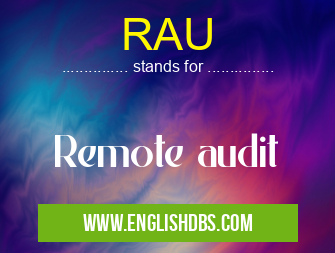What does RAU mean in AUDITING
RAU is a term used to refer to the Remote Audit. This term is used in a variety of settings, including auditing processes for organizations, corporations and companies, as well as in legal and accounting fields. A remote audit occurs when an auditor or another independent agency verifies the accuracy of financial information from afar. Due to advancements in technology, remote audits are becoming increasingly popular and can often be completed faster than traditional on-site inspections.

RAU meaning in Auditing in Business
RAU mostly used in an acronym Auditing in Category Business that means Remote audit
Shorthand: RAU,
Full Form: Remote audit
For more information of "Remote audit", see the section below.
Definition
Remote Audit (RAU) refers to an audit that takes place remotely, usually via the internet or telephone. RAU involves the use of technology to collect data from electronic sources for further assessment by an auditor without physically inspecting the premises of a business or organization. Through RAU, auditors can access accounting records and documents, validate existing operation procedures and policies and execute other tests remotely without having direct access to individuals’ desks or physical equipment within an organization's environment.
Benefits
Amongst its advantages are cost reduction due to no need of travel expenses; flexibility in terms of finding useful time for both parts involved (e.g Auditor/Auditee); improved accuracy as the risk associated with manual recording decreases; Quicker response times on tasks performed; independence is also increased as no need for Face-to-face interaction makes it easier for "hard" topics to be discussed; better quality control on work being performed; Narrowing down focused areas by focusing only on essential parts being assessed at any given time; Workload efficiency increase due to less time required per task; increased security due to less people being present during assessment process and greater controls around sensitive data;
Essential Questions and Answers on Remote audit in "BUSINESS»AUDITING"
What is Remote Audit?
Remote Audit is a technology-driven process that allows an auditor to review a business's financial records remotely and without physical presence. The audit can be conducted through the use of specialized software, which enables auditors to review documents, financial information, and other data in a secure remote environment.
How does Remote Auditing help businesses?
Remote Auditing helps businesses by providing greater access to their financial information and records. It ensures that the company's financial records are secure and up-to-date, which allows auditors to better assess their compliance with rules, regulations and standards. Additionally, using remote auditing reduces the time required for audits as well as travel costs associated with physical audits.
What type of financial information can be reviewed during a Remote Audit?
During a remote audit, auditors may review bank statements, balance sheets, income statements, cash flow statements, government filings and other documents related to the business's financial standing. The exact type of data depends on the purpose of the audit and scope of services being provided by the auditor.
Is Remote Auditing secure?
Yes. Remote Auditing is conducted in a secure environment with authentication protocols in place to ensure only authorized personnel have access to sensitive data. Furthermore, all communication between auditors and clients is encrypted for additional security protection against data breaches or interference.
Is there any risk associated with sharing my financial information during a Remote Audit?
No. All communication between clients and auditors is encrypted using industry-standard protocols for secure transmissions over network connections. Furthermore, all personnel handling this data have signed non-disclosure agreements protecting any confidential data they are exposed to during their service contract.
What are the benefits of conducting an audit remotely compared to doing it onsite?
There are several benefits when conducting audits remotely compared to onsite visits; one being that it saves time due to not having to physically travel in order for an audit team member or client representative to perform specific tasks or answer questions about details of reports or documents; another advantage is cost savings since resources used such as printing/scanning machines are minimized; finally it also provides extra security since access is granted via passwords or special codes set for each party involved.
Is it possible for multiple parties (auditor & client) involved in an audit session happen simultaneously?
Yes - When performing remote audits multiple parties can join simultaneously depending on the setup agreement established beforehand by both parties involved (auditor & client). This enables more efficient collaboration while reducing paperwork traffic between members.
Final Words:
RAU provides numerous benefits that make it an effective method for conducting audits in organizations. By allowing audits to be conducted remotely rather than face-to-face, RAU offers greater convenience, cost savings, security measures and improved efficiency overall for businesses who choose this option over traditional audit methods. It is important for organizations that utilize RAUs ensure that they have established proper safeguards prior before beginning these types of audits so that their data can remain secure while still ensuring accurate results from the audit process itself.
